The Entire SF Masterworks Series Reviewed
 We do love our lists on Worlds Without End and I think it is fair to say that the Gollancz SF Masterworks series stands out among the ones we’ve added so far. You can argue with the selection of course, and many of us probably have, but it is a remarkable series of books, with numerous award winning novels and books that changed the direction of Science Fiction.
We do love our lists on Worlds Without End and I think it is fair to say that the Gollancz SF Masterworks series stands out among the ones we’ve added so far. You can argue with the selection of course, and many of us probably have, but it is a remarkable series of books, with numerous award winning novels and books that changed the direction of Science Fiction.
In honour of LonCon 3, which was held last month, Peter Young, editor of the electronic fanzine Big Sky launched a project to get reviews, in the widest sense of the word, on each individual title and collect them in a special edition. Well, two special editions. The list was simply too long to contain in one volume.
These books are among the most discussed novels in the genre and this gave him plenty of material to choose from. In fact, I don’t really want to think about how much material he had to wade through to make his selection. What he was looking for, in his own words, was this:
Plenty of words have been written about all the titles on the SF Masterworks list. In compiling this fanzine, I probably read thousands of reviews, in magazines, fanzines, websites and blogs. Quickly, a form of mental shorthand was set in place for the kind of reviews I wanted to showcase here. I knew instinctively what I particularly didn’t want: the kind of nonanalytical review that fills almost every corner of Goodreads; similarly, at the other extreme, when a reviewer takes pains to come across as exceedingly academic, I just kinda… zoned out.
What I was looking for can be summed up as well-written ‘opinion / context / commentary’ as opposed to something resembling a ‘formal review’ template, and something akin to a ‘four star’ rating rather than a gushing ‘five’. And of course, the more original, the better.
The result is a collection of opinion form authors, editors, critics and bloggers in a wide variety of styles. The list of names in the table of content is impressive and among them are several Worlds Without Ends regulars. Peter put in a lot of effort to collect some of the most interesting stuff that is out there. The result is something I highly encourage you to check out.
Both issues (numbers 3 and 4) are available for free download here.
RYO Review: Astra by Naomi Foyle
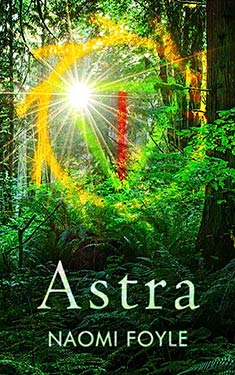
 A couple of weeks ago I won a copy of this novel from Worlds Without End. The nice things about book giveaways is that you tend to take a chance more easily on books that you wouldn’t have purchased or the release of which you most likely wouldn’t have noticed. This is one such book. Although the premise appealed to me I probably would have missed it without the giveaway. Naomi Foyle is a relatively new name in genre fiction. As far as I have been able to determine, this is her second published novel after Seoul Survivors (2013). Astra is the first novel in the Gaia Chronicles and it doesn’t appear to be related to Seoul Survivors. It set in a post apocalyptic world, with a generous helping of genetic engineering and social experiments mixed in. The premise and style of the novel are very interesting but I must admit that at times, the book tried my patience.
A couple of weeks ago I won a copy of this novel from Worlds Without End. The nice things about book giveaways is that you tend to take a chance more easily on books that you wouldn’t have purchased or the release of which you most likely wouldn’t have noticed. This is one such book. Although the premise appealed to me I probably would have missed it without the giveaway. Naomi Foyle is a relatively new name in genre fiction. As far as I have been able to determine, this is her second published novel after Seoul Survivors (2013). Astra is the first novel in the Gaia Chronicles and it doesn’t appear to be related to Seoul Survivors. It set in a post apocalyptic world, with a generous helping of genetic engineering and social experiments mixed in. The premise and style of the novel are very interesting but I must admit that at times, the book tried my patience.
Growing up in Is-Land, seven year old Astra’s greatest wish is to do service in IMBOD, the agency that defends Is-Land’s borders against intruders an terrorists. To do that she needs her Security Shot, a serum that will make her more receptive to the training she will have to follow, more resistant to doubt and closer to the children she grows up with. One of her shelter mothers, Dr. Hokma Blesser, disagrees with Is-Land’s policies in this regards and fears that it will take away something of Astra’s intelligence and curiosity. To excel in science, she needs these qualities in tact. She offers Astra a choice to conspire to refuse the mandatory shot. Reluctantly Astra accepts.
RYO Review: The Gods Themselves by Isaac Asimov
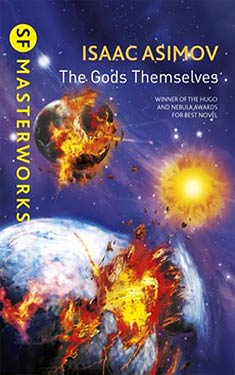
 Given his enormous output, I’m a very inexperienced Asimov reader but from what I understand his career in science fiction can be split into two major periods. The first covered the 1940s and 1950s, in which he wrote a great deal for the magazines that then dominated science fiction. Novels started appearing in 1950, starting with Pebble in the Sky, a novel of the Galactic Empire. So far I’ve read four of his books. The original Foundation trilogy and I, Robot. All of these have been published in the 1950-1953 period and lean heavily on work Asimov had produced in the 1940s. During the 1960s Asimov mostly wrote non-fiction. The Gods Themselves (1972) can be seen as something of a triumphant return to the genre. In this book he answers the critics of his earlier work, winning a Hugo, Nebula and Locus award in the process.
Given his enormous output, I’m a very inexperienced Asimov reader but from what I understand his career in science fiction can be split into two major periods. The first covered the 1940s and 1950s, in which he wrote a great deal for the magazines that then dominated science fiction. Novels started appearing in 1950, starting with Pebble in the Sky, a novel of the Galactic Empire. So far I’ve read four of his books. The original Foundation trilogy and I, Robot. All of these have been published in the 1950-1953 period and lean heavily on work Asimov had produced in the 1940s. During the 1960s Asimov mostly wrote non-fiction. The Gods Themselves (1972) can be seen as something of a triumphant return to the genre. In this book he answers the critics of his earlier work, winning a Hugo, Nebula and Locus award in the process.
The story is that of the discovery of the electron pump, a device that promised a clean and inexhaustible source of energy by using the different laws of nature that can be found in parallel universes. The story of its discovery one of coincidence and pettiness but the man being hailed as the inventor soon achieves rock star status. His influence on the scientific world is such that he leaves a trail of broken careers in his wake and suppresses information that threatens his status and the use of ‘his’ invention. Not everybody is discouraged by his bullying though. Doubts are being raised about the safety of the device. Soon a theory surfaces that suggests continued use might cause the sun to go nova. Bitterness, stupidity and infighting ensue.
WoGF Review: Debris by Jo Anderton
 Guest Blogger and WWEnd member, Rob Weber (valashain), reviews science fiction and fantasy books on his blog Val’s Random Comments which we featured in a previous post: Five SF/F Book Blogs Worth Reading. Be sure to visit his site and let him know you found him here.
Guest Blogger and WWEnd member, Rob Weber (valashain), reviews science fiction and fantasy books on his blog Val’s Random Comments which we featured in a previous post: Five SF/F Book Blogs Worth Reading. Be sure to visit his site and let him know you found him here.
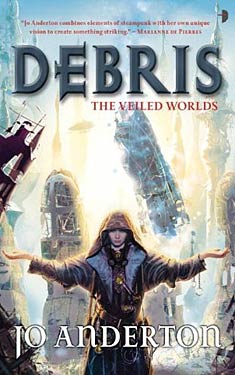 For my twelfth and final read for the Women of Genre Fiction reading challenge I selected Debris (2011) by Jo Anderton. It is a first part in the Veiled Worlds trilogy. The second part, Suited, has been published last year while the third part Unbound is scheduled for sometime next year. I got a whole bunch of Angry Robot titles last year for a bargain price and this was one of them. It has been lingering on the electronic to read stack for quite a while now. I even meant to read it earlier in the year for the reading challenge but every time some other book managed to sneak in first. Fortunately for Anderton I ran out of books by women I haven’t read anything of before last month so the last slot is hers. As usual with Angry Robot publications, Debris is a book that is hard to put into a specific genre. Their strategy to look for books that are different has given us a number of very good novels but also some that don’t work that well. Debris works for the most part but it is not the most challenging read I’ve come across this year.
For my twelfth and final read for the Women of Genre Fiction reading challenge I selected Debris (2011) by Jo Anderton. It is a first part in the Veiled Worlds trilogy. The second part, Suited, has been published last year while the third part Unbound is scheduled for sometime next year. I got a whole bunch of Angry Robot titles last year for a bargain price and this was one of them. It has been lingering on the electronic to read stack for quite a while now. I even meant to read it earlier in the year for the reading challenge but every time some other book managed to sneak in first. Fortunately for Anderton I ran out of books by women I haven’t read anything of before last month so the last slot is hers. As usual with Angry Robot publications, Debris is a book that is hard to put into a specific genre. Their strategy to look for books that are different has given us a number of very good novels but also some that don’t work that well. Debris works for the most part but it is not the most challenging read I’ve come across this year.
Tanyana is one of Varsnia’s most important architects. Her supreme tallent in handing the pions, the force that drives most of Varsnia’s society, has placed her at the very pinnacle of her field, in control of one of the most talented circle of pion manipulators. When working on another magnificent construction, two inspectors show up to monitor the work. Promptly, something goes awfully wrong. Tanyana and her circle are attacked by a type of pions she has never encountered before and the whole collapses around her. She is seriously wounded in the accident and when she regains consciousness she is discredited, in debt and has lost her talent to see pions. Tanyana has lost everything that defined her life.
WoGF Review: The Best of All Possible Worlds by Karen Lord
 Guest Blogger and WWEnd member, Rob Weber (valashain), reviews science fiction and fantasy books on his blog Val’s Random Comments which we featured in a previous post: Five SF/F Book Blogs Worth Reading. Be sure to visit his site and let him know you found him here.
Guest Blogger and WWEnd member, Rob Weber (valashain), reviews science fiction and fantasy books on his blog Val’s Random Comments which we featured in a previous post: Five SF/F Book Blogs Worth Reading. Be sure to visit his site and let him know you found him here.
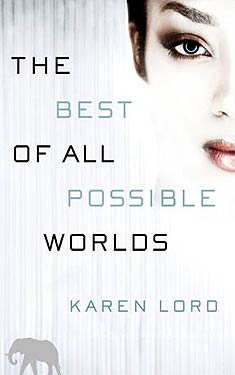 Karen Lord‘s debut novel Redemption in Indigo was one of the books that received a lot of attention in 2011 and 2012. It’s one of those books I mean to pick up but so far I haven’t read it yet. From what I understand of the reviews, it’s a book well worth reading. While looking for suitable books for the Women of Genre Fiction reading challenge I came across Lord’s second novel, The Best of All Possible Worlds, in a bookstore in Amsterdam. If her first novel is anywhere near as good as the second, I can see what the fuss was about. The Best of All Possible Worlds is a very good science fiction novel. Comparisons with the work of Ursula K. Le Guin are made on the inside flap of the cover. For once, I don’t disagree with what it says there. Something the flap text doesn’t mention is that there clearly is a bit of Bradbury in the novel too.
Karen Lord‘s debut novel Redemption in Indigo was one of the books that received a lot of attention in 2011 and 2012. It’s one of those books I mean to pick up but so far I haven’t read it yet. From what I understand of the reviews, it’s a book well worth reading. While looking for suitable books for the Women of Genre Fiction reading challenge I came across Lord’s second novel, The Best of All Possible Worlds, in a bookstore in Amsterdam. If her first novel is anywhere near as good as the second, I can see what the fuss was about. The Best of All Possible Worlds is a very good science fiction novel. Comparisons with the work of Ursula K. Le Guin are made on the inside flap of the cover. For once, I don’t disagree with what it says there. Something the flap text doesn’t mention is that there clearly is a bit of Bradbury in the novel too.
What do you do when your planet and the center of your culture has been wiped out in a single strike? That is the question facing the Sadiri who had the good fortune to be away from home at the time of the strike must answer. Besides drastically reduced numbers, they also face a severe gender imbalance. The question of whether the Sadiri have a future as a separate people or should blend in with the other peoples of the galaxy is very much on their mind. Scientist Grace Delurua is assigned to a project to see if salvaging Sadiri culture by introducing new blood from the planet Cygnus Beta is feasible. It will be a life changing experience for Delurua and the Sadiri.
WoGF Review: Arslan by M. J. Engh
 Guest Blogger and WWEnd member, Rob Weber (valashain), reviews science fiction and fantasy books on his blog Val’s Random Comments which we featured in a previous post: Five SF/F Book Blogs Worth Reading. Be sure to visit his site and let him know you found him here.
Guest Blogger and WWEnd member, Rob Weber (valashain), reviews science fiction and fantasy books on his blog Val’s Random Comments which we featured in a previous post: Five SF/F Book Blogs Worth Reading. Be sure to visit his site and let him know you found him here.
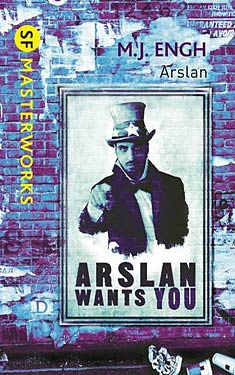 For my tenth read in the Women of Genre Fiction Reading Challenge I picked Arslan by M. J. Engh. I’ve read a couple of more recent works in the past few months so I thought I’d pick an older one this time around. Arslan is Engh’s first novel and was published in 1976. To date, only four novels by Engh have appeared but with that small oeuvre she did manage to make quite an impression. She was named author emerita by the SFWA in 2009. Engh is also a scholar of Roman history. Something that clearly influenced this novel. The edition I’ve read is the Gollancz SF Masterworks edition. I guess the editors of that series have a knack for picking controversial books. Personally, I’m not sure I would have included it.
For my tenth read in the Women of Genre Fiction Reading Challenge I picked Arslan by M. J. Engh. I’ve read a couple of more recent works in the past few months so I thought I’d pick an older one this time around. Arslan is Engh’s first novel and was published in 1976. To date, only four novels by Engh have appeared but with that small oeuvre she did manage to make quite an impression. She was named author emerita by the SFWA in 2009. Engh is also a scholar of Roman history. Something that clearly influenced this novel. The edition I’ve read is the Gollancz SF Masterworks edition. I guess the editors of that series have a knack for picking controversial books. Personally, I’m not sure I would have included it.
Some time during the later stages of the cold war, a figure from the small nation of Turkestan rises to prominence in the world. Caught between China on one side and the USSR on the other, he cleverly uses a combination of politics and extortion to gain control of the armies of the major powers in the world. What he means to do with it remains unclear but the inhabitants of the small town of Kraftsville, Illinois get a shot at finding out when the new dictator of the world settles there for a time. His motives are unclear but he brings great change to the town. Whatever Arslan is up to, he has changed the world for good.
WoGF Review: Palimpsest by Catherynne M. Valente
 Guest Blogger and WWEnd member, Rob Weber (valashain), reviews science fiction and fantasy books on his blog Val’s Random Comments which we featured in a previous post: Five SF/F Book Blogs Worth Reading. Be sure to visit his site and let him know you found him here.
Guest Blogger and WWEnd member, Rob Weber (valashain), reviews science fiction and fantasy books on his blog Val’s Random Comments which we featured in a previous post: Five SF/F Book Blogs Worth Reading. Be sure to visit his site and let him know you found him here.
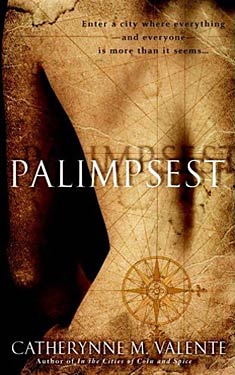 Palimpsest is my ninth read in the Women of Genre Fiction Reading Challenge. I picked it mostly because Valente had caught my eye a few times in the last few years but I never got around to reading anything by her. I remember this novel being well received when it was published. It was nominated for the Locus Fantasy, Hugo and Mythopoeic awards and took the Lambda Literary Award home. Quite an impressive list. The novel also served as an inspiration for Valente’s crowd-funded novel The Girl Who Circumnavigated Fairyland in a Ship of Her Own Making (2011) and it’s sequels. In other words, more than enough reasons to have a closer look at it.
Palimpsest is my ninth read in the Women of Genre Fiction Reading Challenge. I picked it mostly because Valente had caught my eye a few times in the last few years but I never got around to reading anything by her. I remember this novel being well received when it was published. It was nominated for the Locus Fantasy, Hugo and Mythopoeic awards and took the Lambda Literary Award home. Quite an impressive list. The novel also served as an inspiration for Valente’s crowd-funded novel The Girl Who Circumnavigated Fairyland in a Ship of Her Own Making (2011) and it’s sequels. In other words, more than enough reasons to have a closer look at it.
Palimpsest is a city unlike any you’ve heard of. It is a city of wonders, a mystery and a curse at the same time. Only a few people can gain access and only for a single night at a time, before being flung back into their mundane existence. Those who make the passage are marked forever but finding others to help them relive the experience isn’t easy. The city keeps pulling them in however, the lure of Palimpsest is irresistible, and for a lucky few, permanent residence in the city appears possible. If they can overcome the challenges the city sets them.
WoGF Review: Who Fears Death by Nnedi Okorafor
 Guest Blogger and WWEnd member, Rob Weber (valashain), reviews science fiction and fantasy books on his blog Val’s Random Comments which we featured in a previous post: Five SF/F Book Blogs Worth Reading. Be sure to visit his site and let him know you found him here.
Guest Blogger and WWEnd member, Rob Weber (valashain), reviews science fiction and fantasy books on his blog Val’s Random Comments which we featured in a previous post: Five SF/F Book Blogs Worth Reading. Be sure to visit his site and let him know you found him here.
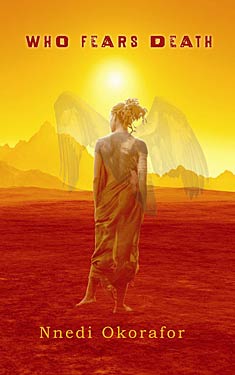 Who Fears Death, by the Nigerian-American author Nnedi Okorafor, is my seventh read for the Women of Genre Fiction Reading Challenge. Not bad considering I only started in May. At this pace I may finish the challenge after all. Who Fears Death was one of the more interesting books that came out in 2010 so of course I missed it back then. It was nominated for a Nebula and the Locus Fantasy Award and won the World Fantasy Award. Okorafor tackles some very difficult themes in this book, stuff that I haven’t come across in many other works of speculative fiction so it is not that surprising the book received so much attention. Thematically this is a very unflinching look at the combination of problems some parts of Africa are facing these days. Structurally, I was less impressed with the later stages novel, which is firmly grounded in a number of overused Fantasy clichés.
Who Fears Death, by the Nigerian-American author Nnedi Okorafor, is my seventh read for the Women of Genre Fiction Reading Challenge. Not bad considering I only started in May. At this pace I may finish the challenge after all. Who Fears Death was one of the more interesting books that came out in 2010 so of course I missed it back then. It was nominated for a Nebula and the Locus Fantasy Award and won the World Fantasy Award. Okorafor tackles some very difficult themes in this book, stuff that I haven’t come across in many other works of speculative fiction so it is not that surprising the book received so much attention. Thematically this is a very unflinching look at the combination of problems some parts of Africa are facing these days. Structurally, I was less impressed with the later stages novel, which is firmly grounded in a number of overused Fantasy clichés.
The novel is set in a post-apocalyptic version of Sudan, where the light skinned Nuru people are waging a war of genocide against the dark skinned Okeke. The main character, Onyesonwu, is born from the rape of an Okeke woman by a Nuru man. Her mother flees the violence and Onyesonwu grows up in a region relatively unaffected by the violence. As an Ewu, a half blood child born of violence, she is something of an outcast in Okeke society. It is believed that a child born of violence can only be violent herself. The situation doesn’t improve when Onyesonwu starts to display extraordinary powers. This combined with her rather temperamental character seem to prove the superstitious Okeke right. She is destined for great things, that much is clear.
WoGF Review: The Handmaid’s Tale by Margaret Atwood
 Guest Blogger and WWEnd member, Rob Weber (valashain), reviews science fiction and fantasy books on his blog Val’s Random Comments which we featured in a previous post: Five SF/F Book Blogs Worth Reading. Be sure to visit his site and let him know you found him here.
Guest Blogger and WWEnd member, Rob Weber (valashain), reviews science fiction and fantasy books on his blog Val’s Random Comments which we featured in a previous post: Five SF/F Book Blogs Worth Reading. Be sure to visit his site and let him know you found him here.
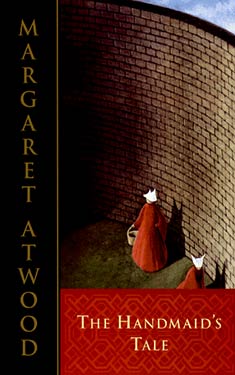 The Handmaid’s Tale by Margaret Atwood is another one of those books everybody but me has read. It is one of the few works of science fiction (I’m not going to get into Atwood’s reluctance to classify it as such in this review) that has managed to appear on required reading lists for English literature classes. I’ve never read anything by Atwood before so I decided to pick this one up for the Women of Genre Fiction reading challenge. I think I can see why it has a certain appeal to both readers of genre fiction and those who prefer mainstream fiction. I found it to be a fascinating read but also a book full of very, very unpleasant things.
The Handmaid’s Tale by Margaret Atwood is another one of those books everybody but me has read. It is one of the few works of science fiction (I’m not going to get into Atwood’s reluctance to classify it as such in this review) that has managed to appear on required reading lists for English literature classes. I’ve never read anything by Atwood before so I decided to pick this one up for the Women of Genre Fiction reading challenge. I think I can see why it has a certain appeal to both readers of genre fiction and those who prefer mainstream fiction. I found it to be a fascinating read but also a book full of very, very unpleasant things.
In the near future plagued by environmental degradation and decreased human fertility, Christian fundamentalists manage to take over the United States. A war ensues and a new theocratic government is established. Soon they start stripping away rights from women and persecuting other religious groups. Our narrator, a woman renamed Offred, is separated from her husband and child and given to a high ranking member of the new regime. It is her job to provide him with the child his wife has been unable to conceive.
WoGF Review: Where Late the Sweet Birds Sang by Kate Wilhelm
 Guest Blogger and WWEnd member, Rob Weber (valashain), reviews science fiction and fantasy books on his blog Val’s Random Comments which we featured in a previous post: Five SF/F Book Blogs Worth Reading. Be sure to visit his site and let him know you found him here.
Guest Blogger and WWEnd member, Rob Weber (valashain), reviews science fiction and fantasy books on his blog Val’s Random Comments which we featured in a previous post: Five SF/F Book Blogs Worth Reading. Be sure to visit his site and let him know you found him here.
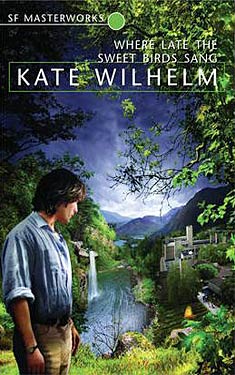 I picked Where Late the Sweet Birds Sang as my third read for the Women of Genre Fiction reading challenge. It’s another one that I’ve head lying around for quite a while. I originally intended to review it late last year but got caught up in moving. Where Late the Sweet Birds Sang is one of Kate Wilhelm‘s most well know works. It won the Locus and Hugo awards and was nominated for a bunch of others, including the Nebula which eventually went to Man Plus by Frederik Pohl. Later on, Wilhelm moved to other genres but in the 1960s and 1970s she produced quite a few science fiction novels. Wilhelm and her second husband Damon Knight, another iconic figure in science fiction, are the founders of the Clarion Workshop, which has become something of an institute in the past decades. The list of participants who went on to become successful authors is impressive.
I picked Where Late the Sweet Birds Sang as my third read for the Women of Genre Fiction reading challenge. It’s another one that I’ve head lying around for quite a while. I originally intended to review it late last year but got caught up in moving. Where Late the Sweet Birds Sang is one of Kate Wilhelm‘s most well know works. It won the Locus and Hugo awards and was nominated for a bunch of others, including the Nebula which eventually went to Man Plus by Frederik Pohl. Later on, Wilhelm moved to other genres but in the 1960s and 1970s she produced quite a few science fiction novels. Wilhelm and her second husband Damon Knight, another iconic figure in science fiction, are the founders of the Clarion Workshop, which has become something of an institute in the past decades. The list of participants who went on to become successful authors is impressive.
Human abuse of the Earth’s ecosystem is finally catching up on mankind. Pollution, radiation and environmental degradation are becoming such huge problems that if affects fertility of just about every plant and animal important to the human food chain.Humanity itself doesn’t escape this tragedy either. Governments pretend it is business as usual, despite the mounting international conflicts over food and other resources. A few people see the end coming however, and set up an isolated community, equipped to survive the end of the world somewhere in a fertile valley in the Eastern USA. Even they are sorely tested when a pandemic breaks out but for the moment the group survives. With sexual reproduction all but impossible, they are doomed to die out however. To ensure humanity’s survival, they resort to cloning themselves in order to create a new generation.



















 Full Details
Full Details

